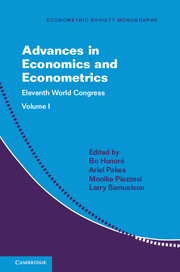Book contents
- Frontmatter
- Contents
- Contributors
- Editors' Note
- 1 Dynamic Mechanism Design: Robustness and Endogenous Types
- 2 Learning, Experimentation, and Information Design
- 3 Dynamic Selection and Reclassification Risk: Theory and Empirics
- 4 Discussion of “Agency Problems”
- 5 Recent Developments in Matching Theory and Their Practical Applications
- 6 What Really Matters in Designing School Choice Mechanisms
- 7 Networks and Markets
- 8 Econometrics of Network Models
- 9 Networks in Economics: Remarks
- Index
1 - Dynamic Mechanism Design: Robustness and Endogenous Types
Published online by Cambridge University Press: 27 October 2017
- Frontmatter
- Contents
- Contributors
- Editors' Note
- 1 Dynamic Mechanism Design: Robustness and Endogenous Types
- 2 Learning, Experimentation, and Information Design
- 3 Dynamic Selection and Reclassification Risk: Theory and Empirics
- 4 Discussion of “Agency Problems”
- 5 Recent Developments in Matching Theory and Their Practical Applications
- 6 What Really Matters in Designing School Choice Mechanisms
- 7 Networks and Markets
- 8 Econometrics of Network Models
- 9 Networks in Economics: Remarks
- Index
Summary
This article was prepared for an invited session at the 2015 World Congress of the Econometric Society. Through a unifying framework, I survey recent developments in the dynamic mechanism design literature and then introduce two new areas that I expect will draw attention in the years to come: robustness and endogenous types.
INTRODUCTION
Long-term contracting plays an important role in a variety of economic problems including trade, employment, regulation, taxation, and finance. Most long-term relationships take place in a “changing world,” that is, in an environment that evolves (stochastically) over time. Think, for example, of (a) the provision of private and public goods to agents whose valuations evolve over time, as the result of shocks to their preferences or learning and experimentation, (b) the design of multi-period procurement auctions when firms’ costs evolve as the result of past investments, (c) the design of optimal tax codes when workers’ productivity evolves over time as the result of changes in technology or because of learning-by-doing, (d) the matching of agents whose values and attractiveness is learned gradually over time through private interactions.
Changes to the environment (either due to exogenous shocks, or to the gradual resolution of uncertainty about constant, but unknown, payoffs) are often anticipated at the time of initial contracting, albeit rarely jointly observed by the parties. By implication, optimal long-term contracts must be flexible to accommodate such changes, while at the same time provide the parties with incentives to share the information they receive over time.
Understanding the properties of optimal long-term contracts is important both for positive and for normative analysis. It permits one to address questions such as: How does the provision of quantity/quality evolve over time under profit-maximizing contracts? How do the dynamics of the allocations under profit maximization compare to their counterparts under welfare maximization? In particular, when do distortions due to profit maximization decrease over time and vanish in the long run? In what environments does the private observability of the “shocks” (i.e., the changes to the environment subsequent to the signing of the initial contract) play no role? When is the nature of the shocks (i.e., whether they are transitory or permanent) relevant for the dynamics of the decisions under optimal contracts?
Information
- Type
- Chapter
- Information
- Advances in Economics and EconometricsEleventh World Congress, pp. 1 - 62Publisher: Cambridge University PressPrint publication year: 2017
Accessibility standard: Unknown
Why this information is here
This section outlines the accessibility features of this content - including support for screen readers, full keyboard navigation and high-contrast display options. This may not be relevant for you.Accessibility Information
- 11
- Cited by
